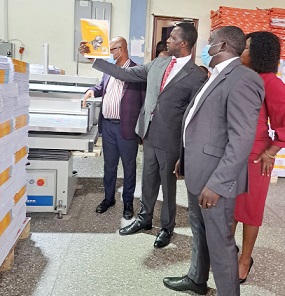
Education Minister commends Appointed Time Printers
The Minister of Education, Dr Yaw Osei Adutwum, has commended the management of Appointed Time Printers Limited for being “diligent” in the printing of textbooks for basic schools.
Dr Adwutum paid a working visit to the company yesterday[July 6, 2022] and said he was impressed with the state of work.
He said the quality of the printing so far had justified the government’s decision that local printers possessed the capacity to deliver on large scale contracts.
“These are made in Ghana books, for Ghanaians. This is highly commendable. The printing of the textbooks has allowed the company to employ more workers,” he said.
Dr Adutwum added that the government was committed to improving and making education accessible to all.
Currently, five local printers — G-PAK Ltd, a subsidiary of the Graphic Communications Group Limited; the Buck Press, Appointed Time Printing Ltd, Jay Kay Industries Ltd and Sec-print Ltd — are engaged in printing the textbooks.
Work in progress
Dr Adutwum was briefed on the printing process and the distribution of the books to the schools by the management of the printing company.
The minister is expected to visit the other local printers to ascertain their preparedness in meeting the deadlines for the printing and distribution of the books.
The Head of Marketing of Appointed Time Printing Limited, Charles Aidoo, said his outfit was working around the clock to meet the deadlines to print 600,000 science textbooks.
The company had so far printed more than 50 per cent of the books.
“Distribution has already commenced, so as and when we print, we distribute. If everything goes on as planned, we will finish the printing of all the books by the end of August this year,” Mr Aidoo said.
Local printing
In June 2021, the government announced a 100 per cent allocation of the printing of textbooks for pupils in basic schools to local printers.
For a start, the textbooks to be printed were to cover kindergarten to primary six.
Previously, the printing of textbooks was mostly done outside the country.
In some cases, a minimal percentage was given to local printers, while the bulk of the printing was done outside the country.
In 2016, however, the then government decided that the printing of textbooks for schools would be done by local printers, and by 2017 when the printing actually began, more than 40,000 people were employed in the sector.
Aside from employment opportunities, the contract also afforded local printers the opportunity to build their capacity and expand their operations.
Writer’s email:
